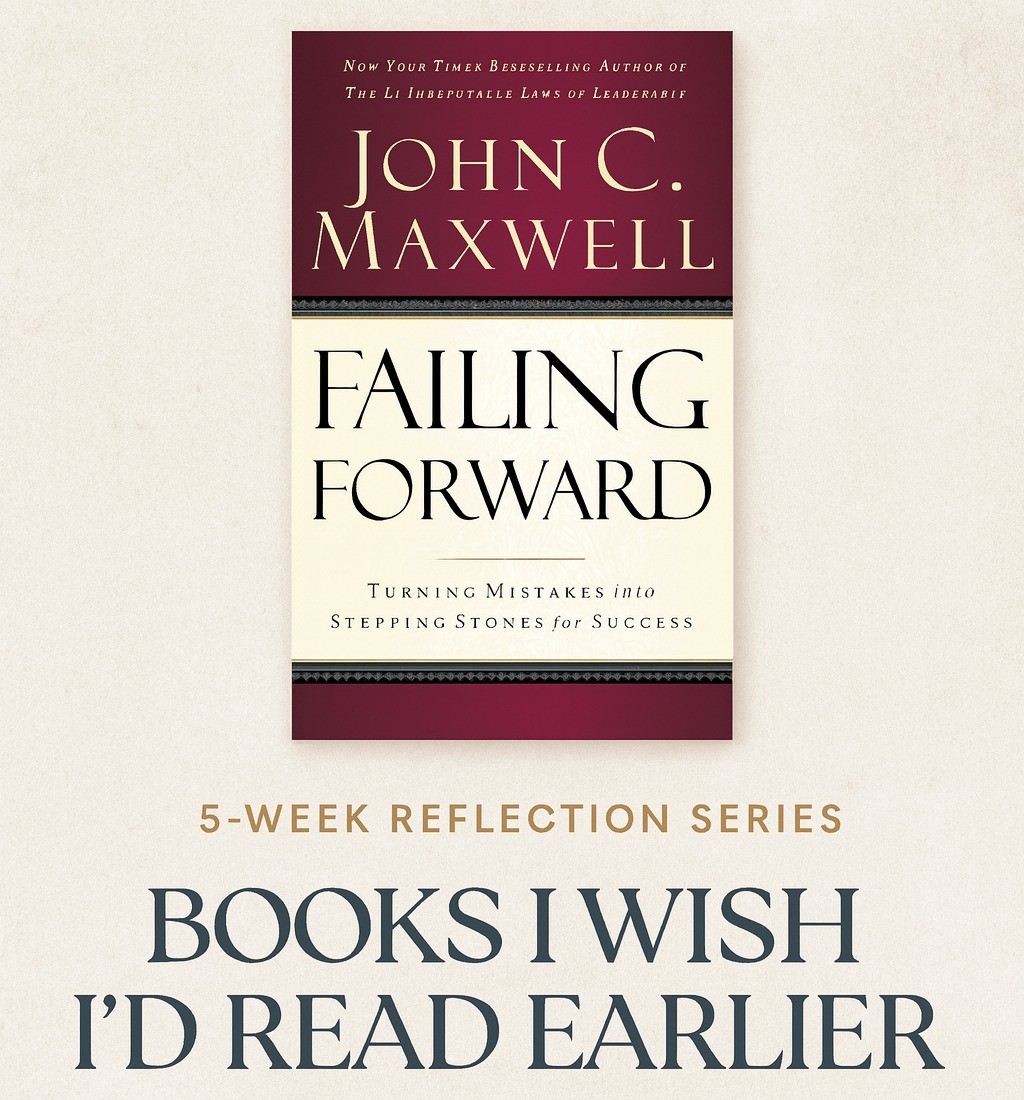“The difference between average people and achieving people is their perception of—and response to—failure.”
—John C. Maxwell
At 68, I find myself reflecting more intentionally—not just on successes, but on the moments that shaped me most. And if I’m honest, many of those were failures.
I read Failing Forward by John Maxwell only recently, but it struck a deep chord. Though new to me, the ideas felt familiar—like truths I had lived through without having the words for them. This book gave me language, perspective, and above all, permission: permission to be imperfect, to make mistakes, and to grow because of them, not in spite of them. It’s one of those books I wish I had read decades earlier. In this first article of my five-week series, I want to share what this book taught me. Next, I’ll reflect on how I’ve applied—or am learning to apply—these lessons in my own journey.
🔍 The Central Idea: Don’t Fall Back—Fail Forward
Maxwell’s core argument is simple yet radical: Failure is not the opposite of success—it is part of it.
What separates people who rise from those who remain stuck is not talent, connections, or luck. It’s this: those who succeed are those who learn from their failures, adjust, and move forward.
That, in essence, is what it means to “fail forward.”
📖 10 Lessons That Stuck with Me
1. Failure is not final unless you quit.
So many stop at the first wall. Maxwell reminds us that most successful people failed not once, but repeatedly. What mattered was that they didn’t give up.
2. You are not your failure.
We often internalize failure as identity. But making a mistake does not mean you are a mistake. This distinction is crucial—especially for leaders under public scrutiny.
3. Responsibility is empowering.
Blame is easy, but useless. Taking ownership of your failure puts the power back in your hands to change course.
4. Learning beats losing.
Each failure carries a lesson—if we’re humble enough to look for it. What did I miss? What will I do differently next time?
5. Failing forward is a decision.
Maxwell says failing forward is not automatic. It’s a mindset you choose: to view failure as a step forward, not a setback.
6. Fear of failure causes paralysis.
One of the most destructive forces in leadership is the fear of appearing weak or failing publicly. But that fear often holds us back from bold, necessary decisions.
7. Your response is more important than the event.
Two people can face the same setback. One becomes bitter; the other becomes better. The difference? Their response.
8. Failure reveals character.
It’s not failure itself, but how we handle it that shows who we are—and who we’re becoming.
9. Failing forward fuels resilience.
Each time we recover, we gain strength, wisdom, and perspective for the next round. This, over time, forms a seasoned leader.
10. Grace is vital.
Though not a Christian book per se, Maxwell’s principles harmonize with the biblical rhythm of grace: falling, being restored, and continuing onward.
🎯 Why This Book Mattered to Me
I’ve worked in high-stakes environments—international development, consulting in governance, chairing national initiatives, and walking with pastors and civil servants. In many of those spaces, failure was either punished or hidden.
In such settings, it’s easy to become risk-averse, perfectionistic, or overly cautious. But Failing Forward reminded me that failure is not a threat to leadership—it’s often its forge.
As a mentor, I now realize I’ve not talked enough about my own missteps. Yet it’s precisely those missteps that forged conviction, humility, and wisdom. I owe it to those coming after me to share not only my successes, but also the scars and the stories behind them.
🧠 A Word to Emerging Leaders
If you’re younger, perhaps in your 20s, 30s or 40s, and still afraid of “messing up,” I urge you to read this book.
Don’t wait until later in life to make peace with failure.
And if you’re in ministry, remember: Peter failed—but Jesus still built the Church through him.
If you’re in governance, recall how Nehemiah took risks—and sometimes faced strong opposition.
And if you’re simply navigating life, know that growth never happens without missteps.
🤝 Let’s Normalize Honest Leadership
One of my hopes as I return to writing is to help restore a culture of honest leadership. That includes being real about failure—not glorifying it but not hiding it either.
I’ve seen how dangerous it is when leaders pretend to be flawless (and I’m guilty of it, so forgive me if you are reading this and you were my victim). It creates distance, fear, and shame. But when we model accountability and bounce back with grace, it frees others to do the same.
💬 Final Word
Failing Forward doesn’t promise quick fixes. But it does offer something far better: a framework for resilience, learning, and growth.
I wish I’d read it earlier. But I’m glad I’ve read it now. And I’m grateful for the chance to share its wisdom with you.
Next in the Series:
📚 What Failing in My 20s Taught Me About Leadership, Character, and Calling
💬 Have you read this book—or failed in a way that changed your life? I’d love to hear your story.
#FailingForward #Leadership #Resilience #Hesabika #WathangaWrites

5 Responses
I am so encouraged; I want to read through the series!
Thanks Dr. Makanda, and I look forward to sharing.
Whooa!
I hear you say, Eben, “Take failure as an event not a person”.
I can’t wait for the NEXT..
What a piece! Thank you for sharing. Learning so much from this platform and looking forward to more and more especially in this series.
Thanks Mercy. Let’s learn together!